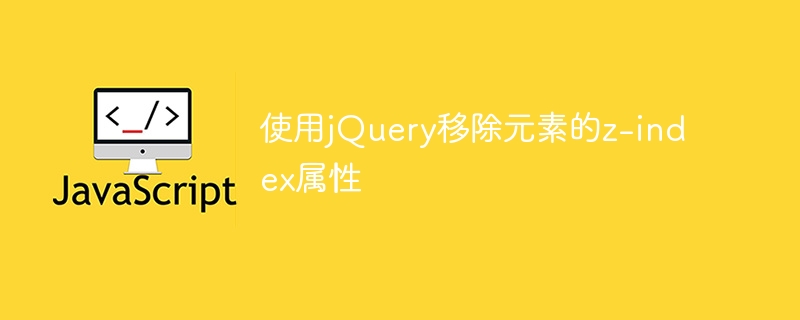

Using jQuery to remove the z-index attribute of an element is a common operation, especially when you need to dynamically adjust the stacking order of elements. By removing the z-index attribute of an element, you can restore the element to its default stacking order so that it is no longer affected by z-index.
The following will use a specific code example to demonstrate how to use jQuery to remove the z-index attribute of an element:
<!DOCTYPE html>
<html>
<head>
<title>移除元素的z-index属性</title>
<script src="https://code.jquery.com/jquery-3.6.0.min.js"></script>
<style>
.box {
width: 100px;
height: 100px;
background-color: #ffcc00;
position: absolute;
top: 50px;
left: 50px;
z-index: 2;
}
</style>
</head>
<body>
<div class="box" id="box1">Box 1</div>
<div class="box" id="box2">Box 2</div>
<button id="removeZIndexBtn">移除z-index属性</button>
<script>
$(document).ready(function(){
$("#removeZIndexBtn").click(function(){
$(".box").css("z-index", ""); // 移除元素的z-index属性
});
});
</script>
</body>
</html>In the above code, we first define two classes with the same The div elements named box represent two boxes respectively. Among them, the z-index attribute of the first box is set to 2. Next we added a button that will trigger the removal of the z-index attribute.
In jQuery's click event handler function, we use $(".box").css("z-index", "");This line of code to remove the z-index attribute from all elements with the class name box. Among them, the empty string is passed to the css method as the second parameter, which means that the value of the attribute is set to the default value, that is, the element is restored to the default cascading order.
With the above code example, we demonstrate how to use jQuery to remove the z-index attribute of an element. This operation can help us dynamically adjust the stacking order of elements, making the display of page elements more flexible and diverse.
The above is the detailed content of Use jQuery to remove the z-index value of an element. For more information, please follow other related articles on the PHP Chinese website!